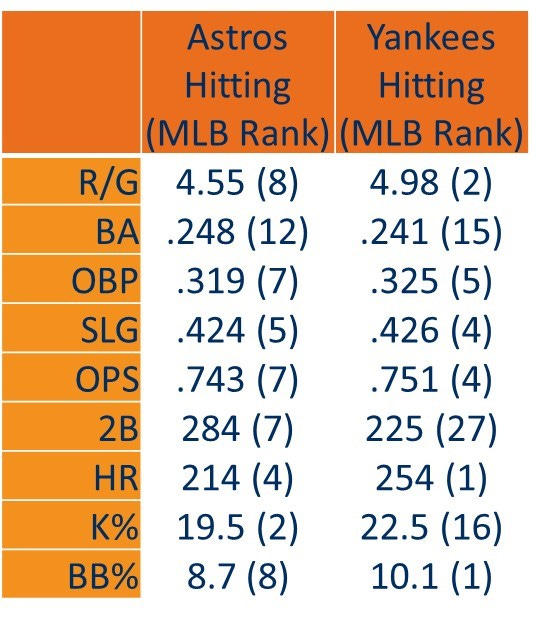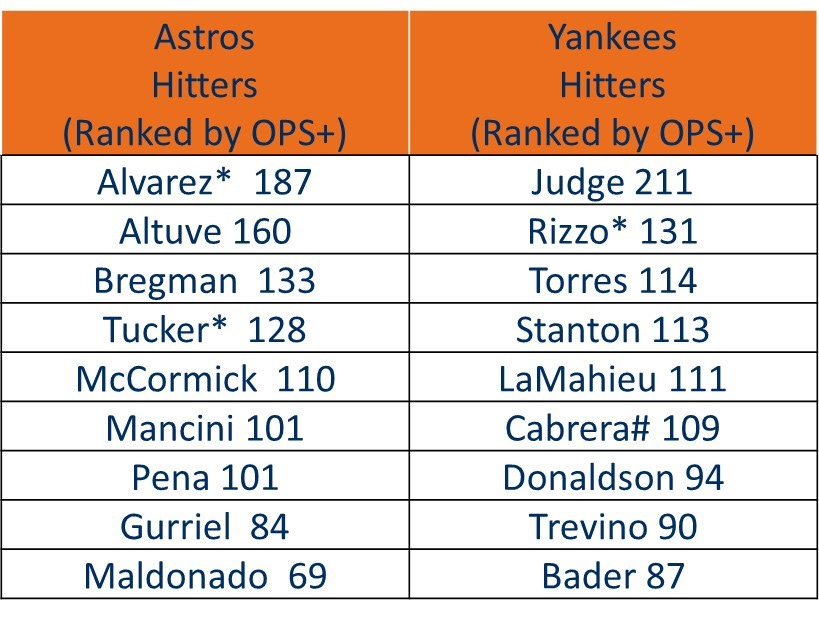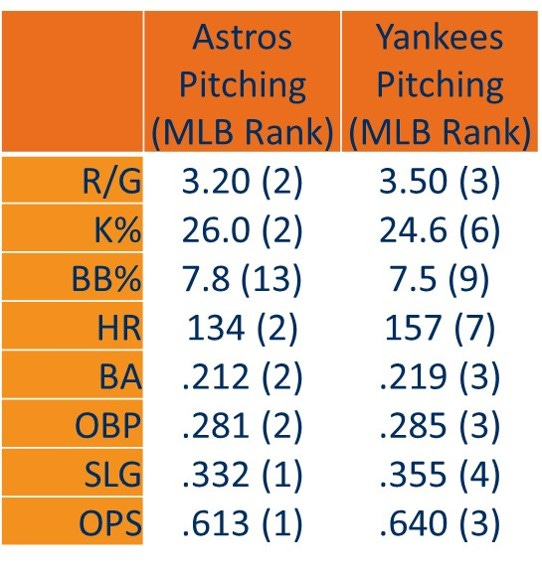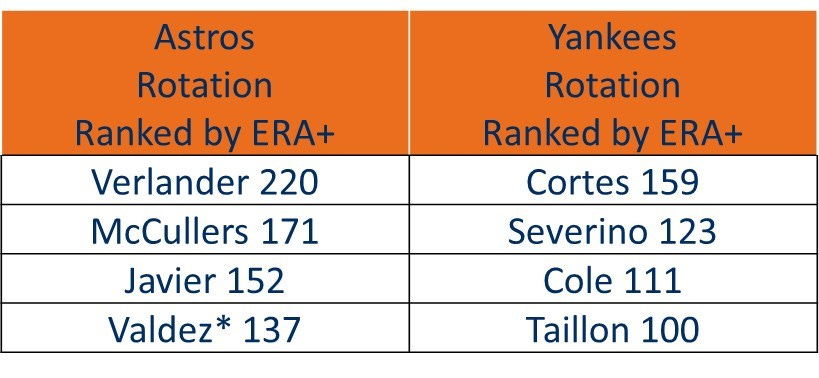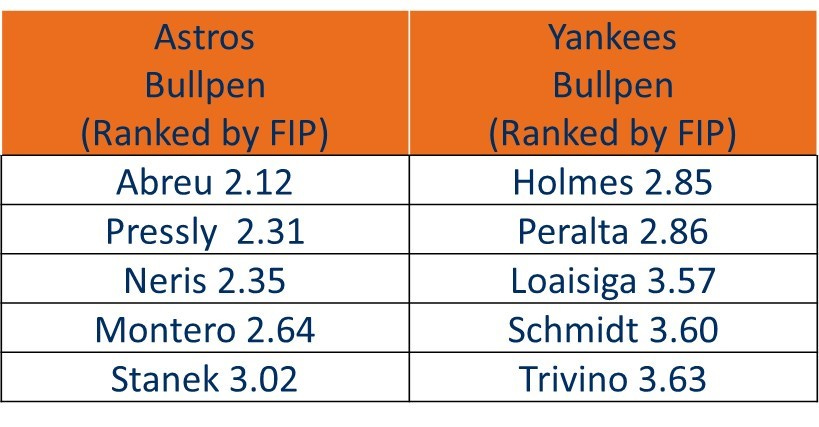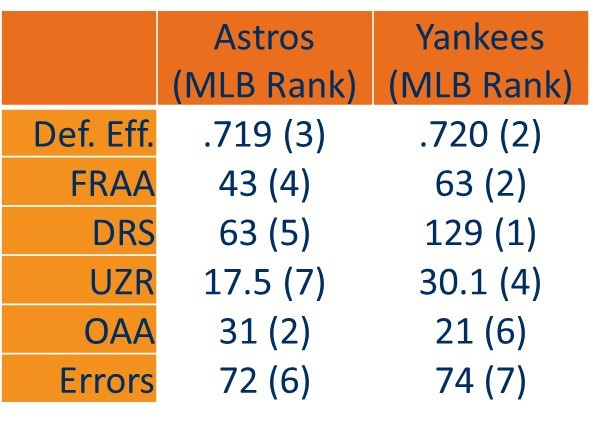In a Heavyweight Battle, Small Margins Might Matter: ALCS Preview
In a series between two very good baseball team, small margins will matter. Big keys: Yankees health. Astros home run prevention. And who gets the broadest offensive contributions?
By mid-May, it was clear. The Astros and the Yankees were the two best teams in the American League. In late April, the Yankees went on an 11 game win streak to put a stranglehold on the AL East. The Astros waited a little later, until early May, to start their own 11 game win streak.
And so, by May 13, it was easy to reach this conclusion:

We did not just cut to the chase. And we have thus spent five months waiting for the two best teams in the American League to meet in the American League Championship Series.
On Tuesday evening in the Bronx, the seemingly inevitable overcame the randomness of the postseason; the Yankees defeated the Guardians 5-1 to win the right to fly to Houston and start the ALCS tonight at Minute Maid Park.
The ALCS will be a matchup of heavyweights. The Yankees won 99 games this season, which is really good. The Astros were even better, winning 106. The Yankees actually had an expected (or Pythagorean) record of 106-56. The Astros had an expected record of 106-56, exactly the same.
In the article, I will run through each teams stats at the plate and on the mound this season, and the players who will play the most in the ALCS. All this data points to the same thing. Both of these teams put up really great numbers this season and have really good players. The Astros have an advantage in run prevention and the Yankees have an advantage in run scoring.
The Astros have some clear advantages on the mound, especially because their bullpen arms are healthier than the Yankees. The Yankees have an offense with a better top bat (as good as Yordan Alvarez is at the plate, Aaron Judge is better) and a stronger floor; the weakest hitters in the Yankee lineup are stronger than the Astros weakest hitters.
But each of these advantages is slight. Which is what you would expect in a matchup of two high quality teams. Small advantages can loom large in a short series, and the Astros seem to have advantages in health and due to wining their Division Series in three games.
Can those small advantages, and the overall talent level of the Astros players, overcome an excellent Yankees team? Well, that’s why we watch the games, in what should be a very good series.
The Hitting
When looking at their stats across the season, the Yankees are a classic slugging team. The led the majors in home runs and walks. They were middle of the pack in batting average and strikeout rate. And finally, they were near the bottom in doubles. When the Yankees hit the ball, it goes far. And they wait to get pitches they can drive.
The Astros have a good deal of similarities to the Yankees when it comes to power (4th in the league in homers). But they are different in their approach at the plate. They are more likely to make contact, as evidence by their lower rates for both strikeouts and walks. They hit 59 more doubles than the Yankees, which helps put their slugging percentage at the same place as the Yankees.
Overall though, the Yankees offense is stronger, as witnessed by its advantage in runs scored per game. The Yankees score on average 4.98 per game; the Astros score 4.55.
The Lineups
If the year long stats show an advantage for the Yankee bats, a review of the lineups for the series does not bear that advantage out. What it shows, in my opinion, is how much the Yankees are dependent on Aaron Judge.
Judge is of course a star, and his 211 OPS+ this season is the highest recorded by a player since Barry Bonds. And he hit 62 home runs. But I’m just as impressed by the high batting average (his .311 was 5th in the majors) and walk rate (2nd in the majors).
The best hitter on the Astros is Yordan Alvarez, and he was outstanding in the regular season, and his 187 OPS+ would have led the majors in 11 of the last 18 seasons. In that sense, he is comparable to Judge. But OPS+ shows he is 24% closer to league average than Judge.
But after Judge, the Yankees have a number of above average hitters (Gleyber Torres, Giancarlo Stanton, and DJ LaMahieu are all 11 to 14% better than the average hitter), but only one at a star level in Anthony Rizzo. The Astros have the players at this level—Jose Altuve, Alex Bregman, and Kyle Tucker.
The Yankees though have a better floor to their lineup as their two least effective offensive players (Jose Trevino and Harrison Bader) are better than the least effective Astros at the plate (Yuli Gurriel and Martin Maldonado).
The Pitching
The Yankees are the 3rd best team in the majors in runs allowed per game, in batting average allowed, on base percentage allowed, and OPS allowed. And in this series, they will be the second best pitching staff in each of those categories.
It’s a testament to the quality of the Astros pitching staff that one can look at the excellent stats put up by Yankees pitchers this season and say that the Astros pitchers are clearly better. It’s a high bar to clear.
But clear it they do; Astros pitchers have given up 0.3 fewer runs per game thanks to a higher strikeout rate and a lower slugging percentage allowed than Yankee hurlers. Both teams have excellent pitching staffs, but the Astros have an edge on the mound.
The Rotation
When we look at the individuals in the rotations for both teams, we can see how the Astros pitching advantage manifests itself. Only one of the Yankee starters has recorded an ERA+ this season better than the lowest number posted by an Astros starter.
By this measure, the best Yankees pitcher this year has been Nestor Cortes, who got this win yesterday in Game 5 of the Yankees-Guardians series. Gerrit Cole is the Yankees ace, but he has struggled with giving up too many home runs. Still, his talent seems better than that number.
The Astros ace Justin Verlander led the American League in ERA in 2022. Lance McCullers and Framber Valdez were excellent in the ALDS, building off high quality work in the regular season. The Astros have a better crop of starting pitchers than the Yankees.
The Bullpen
The Yankees traditionally have a very strong bullpen. And you cannot have the strong statistics for overall pitching without a good bullpen. But when you look at their five relievers who pitched in the ALDS for the Yankees, it’s a mid-tier lot this season.
Clay Holmes has been their best reliever this season and Wandy Peralta worked in every game in the ALDS. The Yankees other three relievers had FIPs this season slightly better than league average. This is a good set of number, but it pales in comparison to the Astros. They have four relievers with FIPS under 3.00 and Ryne Stanek is just above that number.
With the rainout on Monday night moving Game 5 of the ALDS to Tuesday, the Yankees now will play three days in a row, and will start the bottom of their rotation in Games 1 and 2 in Houston. This will make bullpen management a trickier issue for Aaron Boone than it will for Dusty Baker, who has a bullpen that has rested for 3 days since winning the ALDS over Seattle.
The Fielding
An important goal for the Yankees this season was to improve their team defense. They did so in a series of moves, shoring up the right side of their infield when they acquired Isiah Kiner-Falefa and Josh Donaldson from the Twins and when the acquired catcher Jose Trevino and his excellent framing skills from the Rangers. At the trade deadline, they traded fifth starter Jordan Montgomery for Harrison Bader, a defensive whiz in center field.
The numbers in the table above show that these moves paid off. The simplest measure of team defense is Defensive Efficiency, which measures the share of balls hit into play that were turned into an out. The Yankees turned 72% of those balls into outs, the second best rate in baseball. The more advanced defensive metrics provide further support to the argument that the Yankees are one of the handful of best defenses in baseball.
But so are the Astros. Their defense turns almost as many batted balls into outs (only 1 tenth of a percentage point less). They are close to the Yankees in most of the advanced metrics and are ahead of them in Outs Above Average.
The Yankees may have an advantage in fielding, but it is slight.
What To Watch For In The ALCS
The health of the Yankees. The Astros come into the ALCS mostly healthy, outside of Michael Brantley, who has been out since late June.
The Yankees have a number of injury issues, especially in their bullpen. Some of their best bullpen arms (Chad Green & Michael King) suffered season ending injuries. A Zack Britton comeback was short circuited, and Scott Effross, a trade deadline addition, is not playing in the playoffs; he’s having Tommy John surgery instead. Ron Marinaccio was on the IL for the ALDS, but is expected to be on the ALCS roster. Frankie Montas, a big trade deadline acquisition, may be activated for the ALCS, but is expected to pitch out of the bullpen. And Clay Holmes, the Yankees saves leader, is still recovering from a shoulder injury and Aaron Boone elected not to use him on back to back days in the ALDS.
A key reason for the Astros advantage in the bullpen is that they are at full strength there, while the Yankees are not.
And that’s just the arms. DJ LaMahieu was injured and off the ALDS roster, but is likely to be activated. He may take the roster spot of Aaron Hicks, who hurt is knee in Game 5 of the ALDS and is out for the rest of the postseason. Hicks was in the lineup because Andrew Benintendi, another trade deadline addition, was also injured. He is not likely to be on the ALCS roster.
This leaves a big hole in left field for the Yankees. During the season, they used LaMahieu as a utilityman, pushing one of their infielders to DH and Giancarlo Stanton to the outfield. But Stanton would usually play right field (and Judge in center). Stanton, a below average defender only played 4 games in left field this season (and 60 in his career). Such a move would weaken the Yankee defense.
Can the Astros Keep Them in the Park? The Yankees led the majors in home runs. They won the ALDS because of their power. They hit 9 home runs in 5 games against the Guardians. These homers drove in 16 of the 20 runs the Yankees scored in the ALDS.
The Astros were second best in the majors in preventing home runs. And they won their ALDS series thanks to their ability to limit home runs by the opposition. They allowed the Mariners only 2 home runs, and none over the last 29 innings of the series.
This is a classic strength versus strength matchup. If the Astros pitchers do what they have done all season and limit homers from opposing hitters, they are likely to win the series. And if the Yankees hitters do what they done all season and take opposing pitchers deep with great frequency, they are likely to win the series.
Who Gets Broader Offensive Contributions? This series features the top two hitters in the majors this season by OPS+ in Aaron Judge and Yordan Alvarez. Both anchor their team’s offenses.
To me, the big question is the next set of hitters in each lineup. Who will support the big hitting stars?
The Astros have better candidates to do this in Altuve, Bregman, and Tucker. The Yankee candidates have not hit as well this season. But in the ALDS, the Yankees got 3 home runs from Bader, 2 from Stanton, and 1 each from Oswaldo Cabrera and Anthony Rizzo. Stanton and Rizzo feel like big keys to the Yankees offense.

When the Yankees get their secondary guys contributing, their offense is excellent. When they slump; well, that’s when the Yankees had that 19-31 stretch in July and August that allowed the Astros to pass them for the best record in the AL.
Can Astros Pitchers Limit the Walks. The Yankees are a big three true outcomes team. They hit a lot of home runs. They strike out a lot (for a playoff team), and they draw a lot of walks. Astros pitchers do not allow a lot of home runs. They strike a lot of batters out. And they walk a lot of batters (for a playoff team).
So while we should expect Astros pitchers to have high strikeout totals this series, the concern is that they will walk too many Yankees. The Astros were able to shut out the Mariners for 18 innings in large part because they limited their walks. They will have to do that to succeed against the Yankees.
Good Teams. Short Series. Small Margins
The ALCS matchup is one of two excellent teams. The numbers posted in this article help to show that. The Yankees are the second best run scoring team in baseball; the Astros are second best run prevention team in baseball. The Yankees might not be good as the Astros at preventing runs, but they are a top tier run prevention team. And the Astros might not score as many runs as the Yankees, but they are a top tier run scoring team.
What matters in series as close as this on paper? For one, small advantages may matter. That the Astros are healthier than the Yankees is an advantage. Since most of that advantage is in the bullpen, it is small advantage, but it could be meaningful.
Another small advantage for the Astros is one they earned by sweeping the Mariners. They have a more rested pitching staff. They will start their top starter in Game 1 while the Yankees will start their fourth best starter. And the Yankees used their top relievers (Loaisiga, Holmes & Peralta) to close out the Guardians yesterday. It is possible Boone looks to avoid these three tonight or that none will pitch in both Games 1 and 2.
The Yankees have some small advantages too. Jose Trevino led the majors in framing runs this season, which means he is able to “steal” more strikes than other catchers through presenting the pitch in a manner that makes umpires more likely to call it a strike. Martin Maldonado was basically neutral in this category.
Obviously, the biggest factor in a short series is which team happens to get hot at the right time. As we have seen throughout the National League playoffs, short series are not test of which team is better overall, but which team is better over this small handful of games.
A seven game series is more forgiving than a five game series. We saw that in last year’s ALCS when the Astros got blown out in Games 2 and 3, but recovered to take the next three games and the American League pennant.
But a seven game series is still a short series. And baseball is still a sport in which players with a round bat hit a round ball. Lots of random stuff happens all of time. As Joe Sheehan says, variance swamps everything.
The Astros are well positioned as they enter the ALCS and have an excellent ball club. That, and some good fortune, is all we can ask for as Astro fans.




